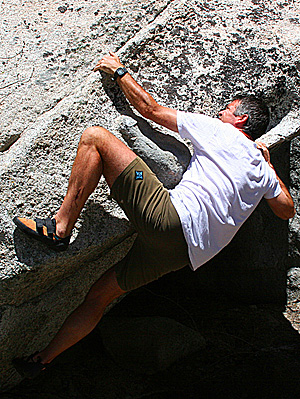Conquistadors of the Useless
Sometimes, you have to try things you know you can’t do.
2010-08-26
by Richard White

I’m a rockclimber, which means that I spend at least part of my time attempting to climb mountains, cliff faces, or even just large boulders. The funny part is that, in many cases, there is an easier way to get to the top. You can walk up Mt. Whitney by a long and relatively gentle trail… or you can climb up one of the vertical routes that lead more or less directly to the top—the East Buttress, say.
For many climbers, rockclimbing gets boiled down to its essentials in “bouldering” which—outside, or inside at a rock gym—a short sequence of difficult moves is climbed. At the gym, bouldering problems are rated from V0 (relatively easy, as these things go) to upwards of V15, which are well-nigh impossible for mere mortals.
And here’s the funny thing: when one is bouldering, you don’t go around looking for problems you CAN do. Because… really, what’s the point of that? Where’s the challenge? The important thing is to find a problem that you can’t do—to be more specific, a problem that you just barely can’t do—so that you can work on it, discuss it with others, and tease out the problem’s secrets. Eventually, within a few minutes, a few hours, or a few days, one arrives at the solution to the problem, and is rewarded with a moment of well-earned satisfaction… and then it’s off to find a new problem. One that you can’t do.
It all seems a bit silly to describe it that way; it’s no wonder that French mountaineer Lionel Terray called his climbing autobiography “Conquistadors of the Useless.” But this idea of advancing one’s skills through attempting things that are just beyond our reach is fundamental to growth, and fundamental to the learning process. It’s certainly what we do for our students when we challenge them with something new, and then provide them with (or guide them in discovering) the tools and skills necessary to advance to the next level.
As teachers, we need to participate in that process ourselves. We need to challenge ourselves just as we challenge our students, and keep attempting things that are just beyond our reach.
Why should you do this? “Because it’s good for you.” Because we should model that process for our students. Because “life-long learning” isn’t just something from your school’s vision statement. Because we should be reminded of the occasional frustration that our students feel when things get especially challenging.
So here’s the question: “What are YOU going to do this new school year to challenge yourself?” What are you going to try that you’ve never tried before? What new unit, or major revision of an old unit, are you going to attempt, even where the risk of failure is perhaps high? What are you going to do that might not work? What are you going to try with your students, even knowing that something might go wrong?
Think about it! Pose yourself a problem in your hybrid classroom teaching that’s just out of your reach, and see what happens.
- Develop a unit that has your students contribute to an online discussion forum.
- Make a commitment to writing an email to parents once a quarter, letting them know how things are going in class.
- Have your students create curriculum-related videos and post them online.
- Create 5-minute video lessons and post them on YouTube.
Me? I’ve posed my own problems for myself.
And I’ll tell you all about it next week.